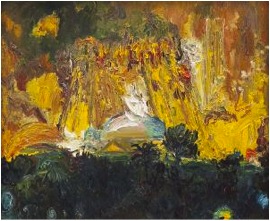
Painting of shock and awe. “Baghdad Bombing”, from the Iraq Series: Shock and Awe I, by American painter Betty Herbert (b. 1929).
WASHINGTON—How would I begin to tell you about war?
If good journalism starts with asking good questions, I have to admit what little I know of the strategy behind the American-led wars of the last decade in Iraq and Afghanistan. Gaining a better understanding of how the military approaches war has armed me with some tools so that I can ask better questions and be more confident in reporting on national security, and also be a better-informed consumer of journalism on this topic.
When I think about my experience of America’s decade of post-9/11 wars, this is my first memory: I was seventeen and watching live images of American bombs bursting over Baghdad in a green glow. They were coming through on a snowy television signal on a March night; I was home from school for spring break and it was the beginning of wartime—whatever that means.
My reaction to war has often been confused and confusing—so how would I begin to try to report on one or the lives affected? I have no context for war in my own life, and so before taking the Covering Conflicts, Terrorism and National Security course at Medill, I found the topic too huge and abstract to approach.
The course has helped me to see why national security journalism is absolutely essential (a U.S. Senate panel just voted this week to authorize $631.4 billion in defense spending for the 2013 fiscal year!), and also as a reporting topic not too big for me to grasp. By learning the ways in which military, government and intelligence experts assess issues and develop strategies for handling them, they have become more accessible to me as reporting topics.
Is there a just war, and were these wars just? It is hard to know how to talk about war in a way that is not influenced by popular sentiment, political jargon or simply a default—that war is an atrocity, and as history has dictated, sometimes necessary.
The wars in Iraq and Afghanistan would be fought hard and fast, with little damage, American military officials said. But with war, ends have rarely, if ever, been achieved without brutal and costly means.
Understanding the tools military officials use to analyze war can help explain how these two wars were fought and why they worked, or didn’t. Like theory in the study of economics, war theory addresses an array of scenarios, decisions and outcomes. In an unpredictable field of possibilities, the strategy helps us to understand how our military leaders attempt to predict the unpredictable and make consequential decisions, at the most basic level, on assumptions.
The most subjective part (the why we went to war) is something that still remains up for debate. But that uncertainty is actually an assumption in the framework of war—a fact I actually found reassuring, because at least we can admit there is no right answer when it comes to war.
Prussian military theorist Carl von Clausewitz wrote his principal work “On War” in 1832, and it remains a must-read exploration for those seeking to understand the moral and political implications of war.
Clausewitz set forth certain truths about war.
Fog and friction are inevitable. Uncertainty and unpredictability when combined with danger, physical stress and human fallibility dominate war.
War is an act of force to compel the enemy to bend its will.
In war, the idea of combat is always present
War’s natural tendency is escalation…towards the maximum possible use of force, and/or until total disarmament of the enemy.
The purpose of war is political and all wars are a products of the societies that fought them.
Once at war, the point of “winning” eventually shifts. The sense of accomplishment comes in lives saved versus lost or getting home alive—at least that has been the case in Iraq and Afghanistan.
There is tactic and strategy. But the greatest strategy in war was perhaps laid out in the The Art of War, a 6th Century B.C. Chinese military strategy book by Sun Tzu. One takeaway: The best way to win a war is to never start one.
For as long as the human record, we the human race have at no time not been at war somewhere. Most war is in some way futile, and all wars have outcomes.
To study and write about conflict I realized I would have to become grounded in my set of beliefs about war and develop my own standard for when using war is ever an acceptable or valid policy tool.
It is also hard to extract oneself from the reporting, even though all good journalists attempt to be fair in their analysis. For me, this starts with a personal assessment of what it means to me to coexist on this earth—Am I a fighter or a pacifist? A realist or an idealist? Do I think it is possible for one nation to use force to compel another nation into compliance and be successful? And if it’s possible, do I want it?
I do not want war. War may bring ends, but only through a process of destruction, which only continues the costly cycle of war amongst us. Now that I have some frameworks for analyzing the purpose of war, I feel confident that I can express that view with concrete examples of why my belief is valid.
As journalists, the premise of our work is simple: to ask good questions. While being better informed on a topic makes the reporting richer and more valuable, what I takeaway from this is course is that the questions do remain simple. What is the purpose of this war? What will it accomplish? What will it cost? What are the unknown costs? Military strategy adapts to national political aims. It is those aims that should change if we want to avoid war.





